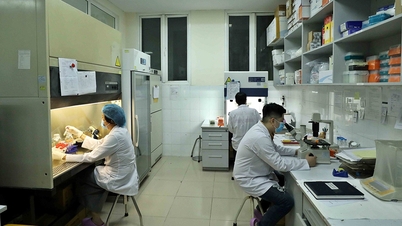
Coffee protects the liver by inhibiting fibrosis and inflammation - Photo: FREEPIK
In addition to confirming previously noted links between coffee and liver health, this study suggests that coffee protects the liver by inhibiting fibrosis and inflammation.
Coffee drinkers have a lower risk of liver disease
According to Medical News Today , studies have long shown that coffee consumption slows the progression of liver disease to fibrosis, cirrhosis, and hepatocellular carcinoma, thanks to the diverse combination of bioactive compounds in coffee.
Coffee also appears to help balance the gut microbiome and modulate epigenetic influences that can impact liver health. Coffee contains unique compounds such as chlorogenic acid and polyphenols that have antioxidant, anti-inflammatory, and liver-regulating effects, helping to promote liver health.
The antioxidant properties of coffee may be especially important, since, as nutritionists emphasize, oxidative stress can negatively impact liver cells, promoting inflammation and insulin resistance.
Oxidative stress is a major cause of liver damage.
In people with chronic hepatitis C, coffee drinking has been shown to be inversely associated with the severity of liver damage.
Hepatitis C patients who drank coffee daily showed a significantly lower rate of progression to cirrhosis. Those who drank two cups of coffee a day were also less likely to develop hepatocellular carcinoma, a disease that often occurs with hepatitis C.
Alcoholic liver damage is marked by the presence of liver enzymes AST, GGT, and ALT. Regular coffee drinkers have lower levels of these enzymes.
Metabolic fatty liver disease (MASLD) is the most common chronic liver disease worldwide. Research reports that regular coffee drinkers are 29% less likely to develop MASLD than non-drinkers.
Be careful with your coffee intake.
The authors traced the chemical mechanisms behind coffee's purported beneficial effects, looking at five areas including antioxidant support, anti-inflammatory support, anti-fibrotic support for the liver, metabolic support, and gut microbiota balance.
A generally safe amount of caffeine is around 400 milligrams, which is equivalent to 3-4 cups a day, but this can vary depending on individual tolerance. For people who are sensitive to caffeine, have pre-existing heart conditions, or have anxiety disorders, side effects can occur even with small amounts of coffee.
Many people may experience heart palpitations, anxiety, insomnia, acid reflux and digestive upset even at low doses. Therefore, the amount of coffee should be adjusted according to the individual. Caution is advised for those with pre-existing heart conditions and/or taking certain medications such as beta-blockers and blood thinners.
Source: https://tuoitre.vn/dieu-gi-khien-uong-ca-phe-co-ich-cho-suc-khoe-gan-20250929191342076.htm


![[Infographic] Notable numbers after 3 months of "reorganizing the country"](https://vphoto.vietnam.vn/thumb/1200x675/vietnam/resource/IMAGE/2025/10/4/ce8bb72c722348e09e942d04f0dd9729)


![[Photo] General Secretary To Lam attends the 8th Congress of the Central Public Security Party Committee](https://vphoto.vietnam.vn/thumb/1200x675/vietnam/resource/IMAGE/2025/10/4/79fadf490f674dc483794f2d955f6045)





























![[Photo] Students of Binh Minh Primary School enjoy the full moon festival, receiving the joys of childhood](https://vphoto.vietnam.vn/thumb/1200x675/vietnam/resource/IMAGE/2025/10/3/8cf8abef22fe4471be400a818912cb85)
![[Photo] Prime Minister Pham Minh Chinh chairs meeting to deploy overcoming consequences of storm No. 10](https://vphoto.vietnam.vn/thumb/1200x675/vietnam/resource/IMAGE/2025/10/3/544f420dcc844463898fcbef46247d16)








































































Comment (0)